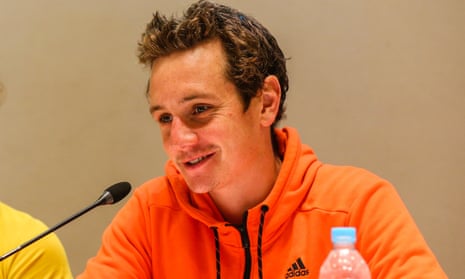A day after revelations about dire water quality in Rio de Janeiro the Olympic triathlon champion, Alistair Brownlee, played down the concerns, saying: “I’ve swum in a lot worse than that.”
The British gold medallist, who will take part in a test event in Copacabana this weekend, said triathletes were resigned to a degree of risk.
“I think it is an unfortunate fact that in any inner-city venue questions are going to get asked, whether it is London or Stockholm or wherever we race,” he said. “I’m no stranger to dirty water. I’ve swum in a lot worse than this, to be honest.”
Brownlee aims to start the defence of his title with a podium finish in the qualifying event for next year’s Games.
The competition, which comes almost a year before the Opening Ceremony, has been overshadowed by concerns about water quality.
An independent study this week found dangerously high levels of adenoviruses and other pathogens in Olympic and Paralympic venues at Guanabara Bay, the Rodrigo de Freitas lagoon and off Copacabana beach. Kristina Mena, a US expert in risk assessment for waterborne viruses, told the Associated Press that there was a 99% chance of infection from three teaspoons of water.
The Rio government’s monitors also revealed unhealthy water quality in a test on Monday that was only several hundred metres outside the perimeter of the triathlon swimming course.
The website of the Rio de Janeiro environmental agency deemed the area “unfit for swimming” but an Olympic official said subsequent tests have shown an improvement to acceptable levels.
“We can assure that the water quality is suitable for competition,” said Rodrigo Garcia, director of sports in the Rio 2016 organising committee.
“This normally happens one day after rain. The dirty water on the street drains to the beach. So we took another measurement one and two days ago and they were green so we have good conditions.”
Some athletes chose not to practise after reading the reports but the Brazilian triathlete Pamela Oliveira was relaxed about the conditions. “There are many events here and millions of tourists swim here, including me, without problems,” she said.
Concerns look set to linger because Rio’s sewage system cannot be upgraded in time to assure clean water before the Games. Several teams are monitoring the quality independently.
Brownlee was undeterred and was among those who entered the water on Friday prior to the two-day event, which will include test runs of the first Paralympic triathlon.
“As an athlete you can do what you can to limit problems: don’t spend too much time in the water beforehand if you are concerned and take precautions like making sure you are clean afterwards,” he said.
